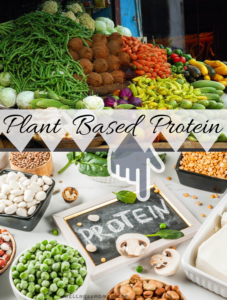 When I advise folks to transition to an all plant diet the biggest concern they voice is about PROTEIN? Where am I going to get my protein? The fact is we have all been taught that the best source of protein is from animal meat. This myth has been put on trial and busted over and over again but the memo was never made public. Really … I wonder why?
When I advise folks to transition to an all plant diet the biggest concern they voice is about PROTEIN? Where am I going to get my protein? The fact is we have all been taught that the best source of protein is from animal meat. This myth has been put on trial and busted over and over again but the memo was never made public. Really … I wonder why?
Yes, animal meat is a source of protein but it really is not the best source to maintain health. When you look at the full package and what meat brings with it… its really risky business to eat animal meat.
Animal meats and products like eggs and dairy have a large amount of fat and cholesterol. This fat is saturated and has been linked to many of our lifestyle diseases like diabetes, heart attacks, strokes, osteoporosis and cancers. How you ask? Well in a nut shell the increased fat in the diet potentiates diabetes by affecting how well insulin can work. The increased cholesterol is presumed to be connected to plaque build up in the arteries leading to heart attacks and strokes. Breast, Prostate and Colon cancer are closely linked to increased saturated fat consumption. Increased meat protein in the diet overwhelms the kidneys leading to calcium being taken away from the bones as this protein in being processed. Those topics all deserve their own blog write up I realize. Leaving definitely no time to go into the issues regarding antibiotics and hormones concerns with meats.
So your question still stands though? where do I get my protein. Simple… the same place the animals get theirs … Plants. A plant based diet provides sufficient and adequate amounts of daily protein required for health. We need only about 45 – 55 g of protein a day (0.8 g per kilogram). The average American however eats 3 times that every day.
1.So first of all we need to consume less protein than we are doing now.
2. Next realize that there is protein in almost every plant food. Some have more than others and here are the power ones.
1/2 c Tofu -10 grams
1/2 c Edamame beans – 8.5g
1/2 c Lentils – 9 g
1/2 c Chickpeas – 7 grams
1/2 c peanuts – 20 grams
1/2 c Almonds – 16 grams
1/2 c steel cut oats – 5 grams
1 c- Quinoa 8 grams
1 TBS seeds – 2 grams
One baked potato – 8 grams
one stalk broccoli- 4 grams
5 mushrooms – 3 grams
1 cup of blackberries – 2 grams
1 slice of Ezekiel bread – 4 grams
So if you have a bowl of oatmeal with blackberries, a slice of Ezekiel toast and peanut butter that’s already over 20 grams of protein right there. You’re half way there and you even haven’t gotten to lunch yet. For lunch if you have a baked potato with lentils and broccoli you can get to 30 grams easily. You haven’t gotten to Dinner yet and you’ve met your daily requirements.
The beauty about plant protein power is that you not only get all the protein you need but there are loads of added benefits like antioxidants, phyto-chemicals and a load of other protective nutrients to fight disease and keep healthy and strong.
References
Meta analysis of randomized controlled trials of red meat consumption in comparison with various comparison diets on cardiovascular risk factors. (in other words – Substituting healthy plant proteins for red meat lowers risk for heart disease.) Circulation April 9, 2019
Association of animal and plant protein intake with all- cause and cause- specific mortality. Song, M JAMA 2016
Vegetarian dietary patterns and mortality IN Adventist health study 2. Olrich, M. JAMA, 2014
Thank you mom for this wonderful post
My pleasure son 🙂